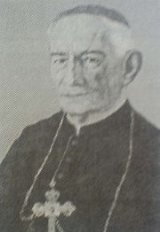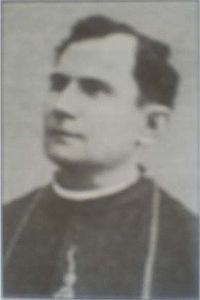
Juan Sinforiano Bogarín
Encyclopedia
Juan Sinforiano Bogarín (August 21, 1863 - February 25, 1949) was an eminent Paraguay
an clergyman, the first Roman Catholic archbishop of Paraguay
.
, a town in the Paraguarí Department
, to Juan José Bogarin and Mónica de la Cruz González. Having become orphans after the War of the Triple Alliance
, Juan Sinforiano and his three siblings were raised by their maternal aunt, María Pabla González.
He spent his childhood in Arecaya, Limpio
. In 1880, at the age of 16, he entered the Counselor Seminary of Asunción, and graduated six years later. He was ordained as a priest on February 24, 1886 in the Cathedral by Bishop Juan Antonio Aponte. He worked there until 1887, when he was chosen as Bishop by then-Pope Leo XIII
on September 21, 1894, after the death of Bishop Aponte in 1891. He was consecrated by the Main Bishop of Trípoli, Luis Lasagna, on February 3, 1895 (February 3 is the Feast of St. Blaise, the patron saint
of Paraguay).
Bogarín held several positions in the Paraguayan Church, including that of rector churchman of the Cathedral and that of general secretary of the Ecclesiastic Curia.

s such as Catholic Action, the Catholic Ladies' League, and the Catholic Youth Federation, in an effort to restore order and social respect in Paraguay.
He struggled against liberal
organizations that proposed civil marriage, divorce and lay education. He also campaigned against Freemasonry
, anarchism
, and partisan fanaticism.
The history of Paraguay contained a long and tumultuous record of revolutions and coup d'états. He responded to each upheaval he witnessed through his Pastoral Letters, demanding peace between families, demanding cessation of all tortures and hostilities, and exhorting people to take care of the spiritual needs of their brethren.
The "traveler bishop" toured almost fifty thousand kilometers of Paraguay, encouraging people in the countryside to socially organize to defend their lands and their rights, without forgetting his teachings about how to get closer to Christ.
The Bishop Hermenegildo Roa was his secretary and general vicar of the dioceses.
In 1929, the Ecclesiastic Province of the Paraguay was formed from the Archdioceses of Asunción, the dioceses of Villa Rica del Espíritu Santo and the dioceses of Concepción.
On August 15, 1930, he received the archiepiscopal pallium and a time later, after three decades of waiting, obtained the separation of the Archdioceses of Buenos Aires
.
After a life fully dedicated to his evangelist labors, the archbishop died at the age of 85 in 1949.
Paraguay
Paraguay , officially the Republic of Paraguay , is a landlocked country in South America. It is bordered by Argentina to the south and southwest, Brazil to the east and northeast, and Bolivia to the northwest. Paraguay lies on both banks of the Paraguay River, which runs through the center of the...
an clergyman, the first Roman Catholic archbishop of Paraguay
Paraguay
Paraguay , officially the Republic of Paraguay , is a landlocked country in South America. It is bordered by Argentina to the south and southwest, Brazil to the east and northeast, and Bolivia to the northwest. Paraguay lies on both banks of the Paraguay River, which runs through the center of the...
.
His life
Bogarín was born in MbuyapeyMbuyapey
Mbuyapey is a small district in Paraguarí, a department of Paraguay. It contains the town of Mbuyapey, which has a population of around 2,400.- Sources : * – World-Gazetteer.com...
, a town in the Paraguarí Department
Paraguarí Department
Paraguarí is a departamento in Paraguay. At the 2002 census it had a population of 221,932. The capital is the city of Paraguarí.- History :...
, to Juan José Bogarin and Mónica de la Cruz González. Having become orphans after the War of the Triple Alliance
War of the Triple Alliance
The Paraguayan War , also known as War of the Triple Alliance , was a military conflict in South America fought from 1864 to 1870 between Paraguay and the Triple Alliance of Argentina, Brazil, and Uruguay...
, Juan Sinforiano and his three siblings were raised by their maternal aunt, María Pabla González.
He spent his childhood in Arecaya, Limpio
Limpio
The city of Limpio is located in the Central Department, Paraguay. It was founded on February 2, 1785, by the Friar Luís de Bolaños under the name of San José de los Campos Limpios de Tapúa....
. In 1880, at the age of 16, he entered the Counselor Seminary of Asunción, and graduated six years later. He was ordained as a priest on February 24, 1886 in the Cathedral by Bishop Juan Antonio Aponte. He worked there until 1887, when he was chosen as Bishop by then-Pope Leo XIII
Pope Leo XIII
Pope Leo XIII , born Vincenzo Gioacchino Raffaele Luigi Pecci to an Italian comital family, was the 256th Pope of the Roman Catholic Church, reigning from 1878 to 1903...
on September 21, 1894, after the death of Bishop Aponte in 1891. He was consecrated by the Main Bishop of Trípoli, Luis Lasagna, on February 3, 1895 (February 3 is the Feast of St. Blaise, the patron saint
Patron saint
A patron saint is a saint who is regarded as the intercessor and advocate in heaven of a nation, place, craft, activity, class, clan, family, or person...
of Paraguay).
Bogarín held several positions in the Paraguayan Church, including that of rector churchman of the Cathedral and that of general secretary of the Ecclesiastic Curia.

Priestly career
Bogarin promoted the organization of lay apostolateLay apostolate
The lay apostolate is made up from laypeople and consecrated religious who exercise a ministry in cooperation with the Catholic Church. These organizations cooperate with ecclesiastical authorities. They operate "under direction of her pastors" but are not members of the official Church hierarchy...
s such as Catholic Action, the Catholic Ladies' League, and the Catholic Youth Federation, in an effort to restore order and social respect in Paraguay.
He struggled against liberal
Liberalism
Liberalism is the belief in the importance of liberty and equal rights. Liberals espouse a wide array of views depending on their understanding of these principles, but generally, liberals support ideas such as constitutionalism, liberal democracy, free and fair elections, human rights,...
organizations that proposed civil marriage, divorce and lay education. He also campaigned against Freemasonry
Freemasonry
Freemasonry is a fraternal organisation that arose from obscure origins in the late 16th to early 17th century. Freemasonry now exists in various forms all over the world, with a membership estimated at around six million, including approximately 150,000 under the jurisdictions of the Grand Lodge...
, anarchism
Anarchism
Anarchism is generally defined as the political philosophy which holds the state to be undesirable, unnecessary, and harmful, or alternatively as opposing authority in the conduct of human relations...
, and partisan fanaticism.
The history of Paraguay contained a long and tumultuous record of revolutions and coup d'états. He responded to each upheaval he witnessed through his Pastoral Letters, demanding peace between families, demanding cessation of all tortures and hostilities, and exhorting people to take care of the spiritual needs of their brethren.
The "traveler bishop" toured almost fifty thousand kilometers of Paraguay, encouraging people in the countryside to socially organize to defend their lands and their rights, without forgetting his teachings about how to get closer to Christ.
The Bishop Hermenegildo Roa was his secretary and general vicar of the dioceses.
In 1929, the Ecclesiastic Province of the Paraguay was formed from the Archdioceses of Asunción, the dioceses of Villa Rica del Espíritu Santo and the dioceses of Concepción.
On August 15, 1930, he received the archiepiscopal pallium and a time later, after three decades of waiting, obtained the separation of the Archdioceses of Buenos Aires
Buenos Aires
Buenos Aires is the capital and largest city of Argentina, and the second-largest metropolitan area in South America, after São Paulo. It is located on the western shore of the estuary of the Río de la Plata, on the southeastern coast of the South American continent...
.
After a life fully dedicated to his evangelist labors, the archbishop died at the age of 85 in 1949.

